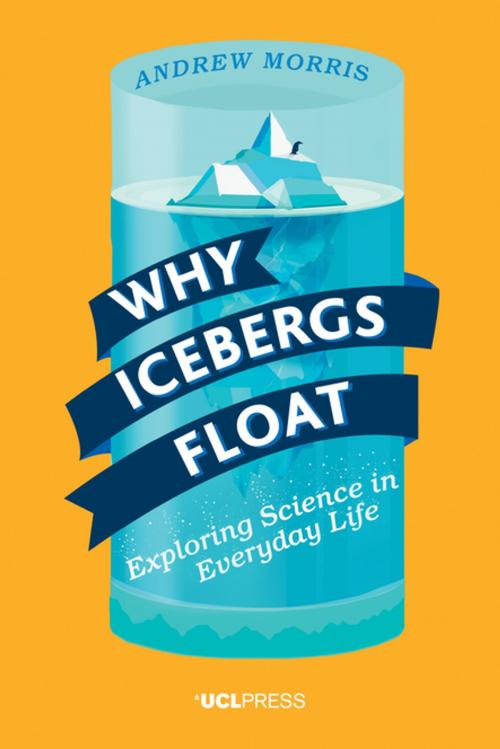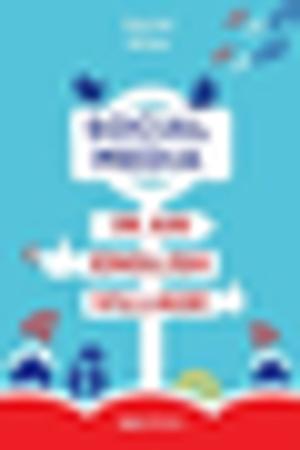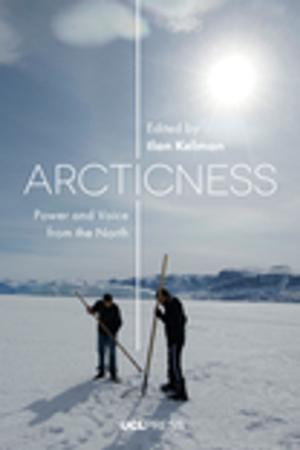Why Icebergs Float
Exploring Science in Everyday Life
Nonfiction, Science & Nature, Science, Chemistry, General Chemistry, Biological Sciences, Biology| Author: | Dr Andrew Morris | ISBN: | 9781911307051 |
| Publisher: | UCL Press | Publication: | October 24, 2016 |
| Imprint: | UCL Press | Language: | English |
| Author: | Dr Andrew Morris |
| ISBN: | 9781911307051 |
| Publisher: | UCL Press |
| Publication: | October 24, 2016 |
| Imprint: | UCL Press |
| Language: | English |
From paintings and food to illness and icebergs, science is happening everywhere. Rather than follow the path of a syllabus or textbook, Andrew Morris takes examples from the science we see every day and uses them as entry points to explain a number of fundamental scientific concepts – from understanding colour to the nature of hormones – in ways that anyone can grasp. While each chapter offers a separate story, they are linked together by their fascinating relevance to our daily lives.
The topics explored in each chapter are based on hundreds of discussions the author has led with adult science learners over many years – people who came from all walks of life and had no scientific training, but had developed a burning curiosity to understand the world around them. This book encourages us to reflect on our own relationship with science and serves as an important reminder of why we should continue learning as adults.
Praise for Why Icebergs Float
'Asking questions is an important scientific skill and sometimes we can only understand something when we can find the language to ask the right questions; books like this can be really helpful in this respect....This book is one of UCL’s open access books. This means that it can be downloaded as a free PDF from the UCL Press website. The commitment to making scientific works such as this freely available is very welcome. This book is very accessible and deserves to reach a wide audience.'
- School Science Review
'Morris says in the prologue: ‘If you come away from this book with a greater interest in science and enhanced confidence about tackling it, the book will have served its purpose.’ So, don’t be afraid of science and give Why Icebergs Float a chance. You will absolutely enjoy it.'
- Chemistry World
'[Why Icebergs Float] draws on experiences and first-person narratives of adult learners who – out of genuine curiosity or embarrassment at their levels of scientific ignorance – have sought to catch-up on lost school science and get a better understanding of their surroundings as a result.'
- Education Journal
'‘The approach illustrates beautifully the influence of language on understanding. The author makes clear how common language can be misleading when scientists have used everyday words but given them very specific meanings.’
Physics Education
From paintings and food to illness and icebergs, science is happening everywhere. Rather than follow the path of a syllabus or textbook, Andrew Morris takes examples from the science we see every day and uses them as entry points to explain a number of fundamental scientific concepts – from understanding colour to the nature of hormones – in ways that anyone can grasp. While each chapter offers a separate story, they are linked together by their fascinating relevance to our daily lives.
The topics explored in each chapter are based on hundreds of discussions the author has led with adult science learners over many years – people who came from all walks of life and had no scientific training, but had developed a burning curiosity to understand the world around them. This book encourages us to reflect on our own relationship with science and serves as an important reminder of why we should continue learning as adults.
Praise for Why Icebergs Float
'Asking questions is an important scientific skill and sometimes we can only understand something when we can find the language to ask the right questions; books like this can be really helpful in this respect....This book is one of UCL’s open access books. This means that it can be downloaded as a free PDF from the UCL Press website. The commitment to making scientific works such as this freely available is very welcome. This book is very accessible and deserves to reach a wide audience.'
- School Science Review
'Morris says in the prologue: ‘If you come away from this book with a greater interest in science and enhanced confidence about tackling it, the book will have served its purpose.’ So, don’t be afraid of science and give Why Icebergs Float a chance. You will absolutely enjoy it.'
- Chemistry World
'[Why Icebergs Float] draws on experiences and first-person narratives of adult learners who – out of genuine curiosity or embarrassment at their levels of scientific ignorance – have sought to catch-up on lost school science and get a better understanding of their surroundings as a result.'
- Education Journal
'‘The approach illustrates beautifully the influence of language on understanding. The author makes clear how common language can be misleading when scientists have used everyday words but given them very specific meanings.’
Physics Education















